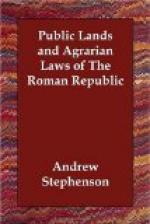Agrarian Law of Curius. Beyond the distribution of the ager publicus which formed the basis of the numerous colonies of this period and which will be considered in their proper place, the next agrarian movement was that of Curius Dentatus. At the close of the third Samnite War the people were in great distress, as agricultural pursuits had been greatly interrupted by continued warfare. Now there seemed to be a chance of remedying this. Large tracts of land had been taken from the Samnites and Sabines, and it was now at the disposal of the Roman[2] state for purposes of colonization and division among the impoverished citizens. In the year 287,[3] a bill was introduced by Manius Curius Dentatus, the plebeian consul for this year, and hero of the third Samnite War. He proposed giving to the citizens assignments of land in the Sabine country of seven jugera[4] each. It is certain that this bill met with great opposition but we have not been informed as to the causes.[5] It is safe to conclude, however, that the question was whether assignments of land with full right of property should be made in districts which the great land-owners wished to keep open for occupation in order that they might pasture herds thereon. The senate and the nobility so bitterly opposed the plan that the plebeians despairing of success, withdrew to the Janiculum and only on account of threatening war did they consent to the proposals of Quintus Hortensius.[6] By this move the lex Hortensia[7] was passed and, doubtless, the agraria lex was enacted at the same time although nothing definite is known concerning this point. The people must have been pacified by some other means than the mere granting of more political power. Nothing less than a share of the conquered territory would have satisfied them or induced them to return and again take up the burden of war.




